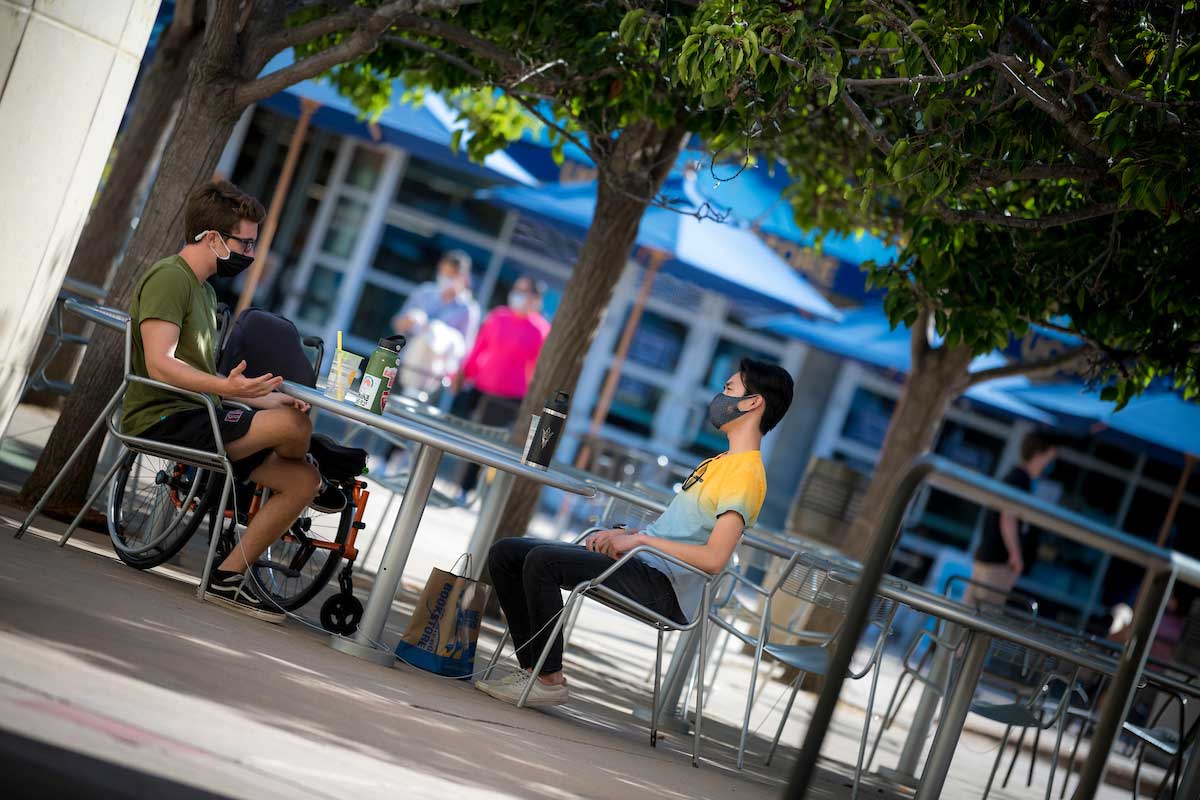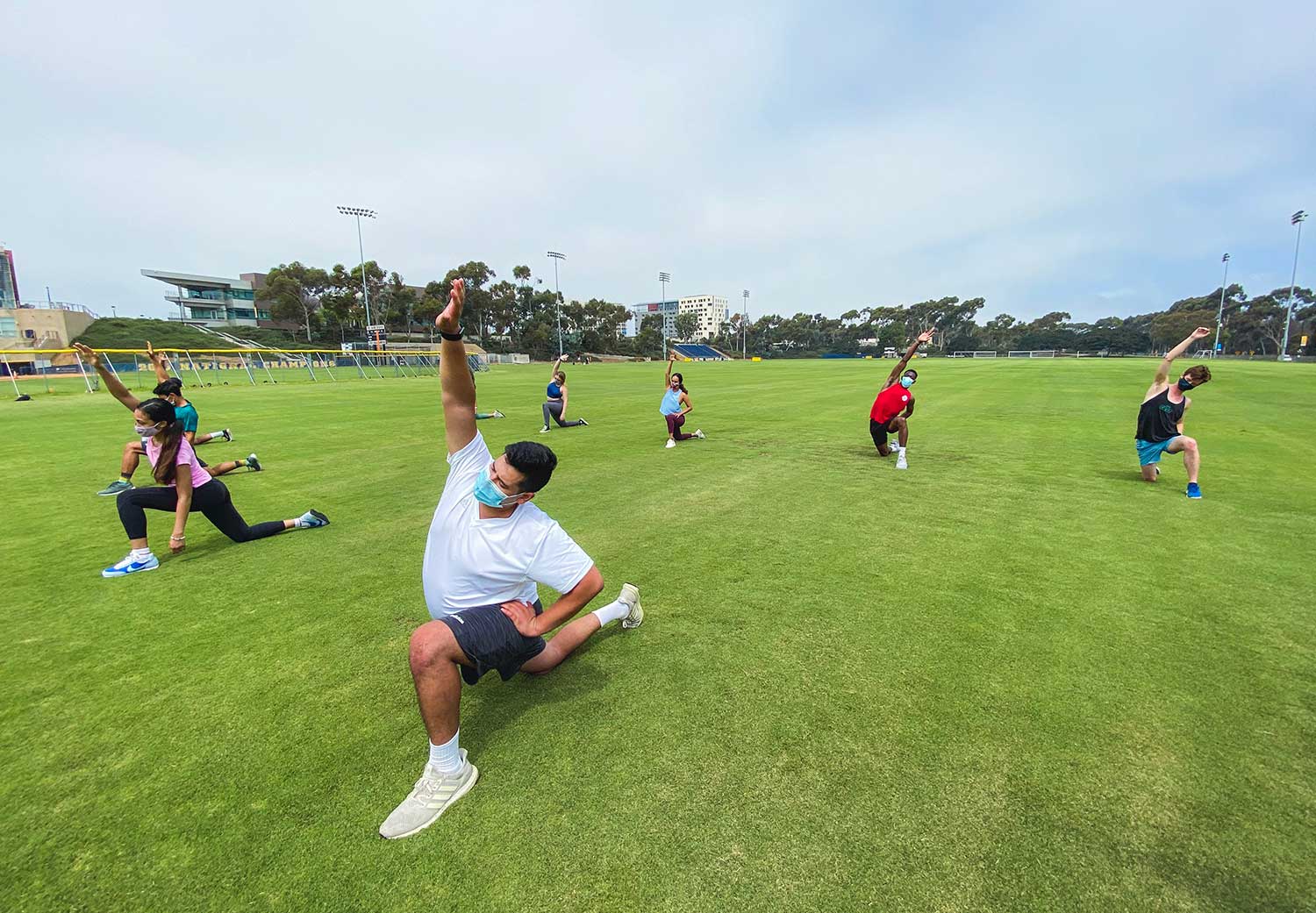By:
- Erika Johnson
Published Date
By:
- Erika Johnson
Share This:

Q&A: Student Socializing, Recreation and Travel
UC San Diego’s fall plan is continually evolving, informed by the university’s Return to Learn program. We invited students to submit their questions about how to safely socialize on campus, what happens if residential students must travel off-campus for an extended period, outdoor recreation classes offered, study spaces available and more.
Q. What new study areas are available on campus?
A. Students can now utilize the Biomedical Library Building for individual quiet study Sunday-Thursday during designated hours, by reservation only. The space offers limited individual seating, computers, space for student parents and self-serve printers and book scanner, but does not offer group study, group study rooms, access to collections or library services. Reservations can be made here and you must bring your reservation confirmation with you as well as your UC San Diego ID card and campus health screening results at check-in.
Q. Are students allowed to socialize in groups outside?
A. UC San Diego received approval from the County of San Diego to offer a pilot program that allows students to socialize in small groups (three or less), so long as they are outside, wearing face coverings and observing physical distancing. Students are asked to avoid congregating in areas adjacent to campus dining halls and classrooms to minimize congestion.
Socializing Guidelines:
- Complete the symptom and exposure screening and receive a green thumb prior to gathering.
- Everyone must wear a facial covering at all times.
- Physical distancing (minimum of 6 feet) must be maintained at all times.
- Students can gather in groups of up to three for up to two hours.
- Socializing in small groups may not occur as part of any organized event or program.
- Students are not allowed to have anyone in their apartment or suite who is not contracted to live in that space, and are not allowed to visit other apartments or suites.
- Students are encouraged to keep track of who they are socializing with for contact tracing purposes, should it become necessary.

Q. What outdoor recreation facilities and classes are available?
A. A number of outdoor recreation facilities are now open with enhanced safety measures. These include the Track and Field for individual use, the Canyonview Pool for lap swimming by reservation, the graduate housing pool and outdoor tennis courts. In addition Recreation is now offering several outdoor, in-person recreation classes, from archery and hip hop dance to surfing fundamentals and tennis. Students interested in cycling, yoga, bootcamp and other fitness classes can join a selection of classes held each week at the Main Gym Natatorium Patio, by reservation only. And for those seeking more adventurous activities, there are also planned a series of hikes, tide pooling and snorkeling trips near the campus.
Reservations are required for entry into the facilities during the reopening. This will ensure students get the workout they want while promoting physical distancing and efficiency in cleaning. All reservations require a Return membership, which is available to students at no-cost. The membership will allow you the Recreation access you’ve been missing, without affecting the status of any standard membership you may already possess.
Recreations has instituted new cleaning protocols and has trained staff members in preparation for reopening RIMAC gym for workouts and classes. The plan includes transforming the basketball court near Main Gym into an outdoor strength training area by winter quarter.
Q. What happens if a residential student travels off-campus for an extended period of time?
A. Residential students needing to leave campus for a period of more than 18 hours or overnight must notify their Residential Life staff through the Housing Portal and selecting the “Returning Home After Move-In” link. Completing this form will also generate an email to the Vice Chancellor of Student Affairs.
When students are away from campus, they should wear a face covering at all times, maintain physical distance and complete the daily symptom screener. Students are also required to complete the daily symptom screener regardless of their location.
Upon returning, students must sequester in their unit for 14 days. Sequestration means wearing a face covering within their residential unit, except when in their personal bedroom and the shower, and also maintaining physical distance within their residential unit. Outside of the residential unit, they must wear a face covering at all times (with the exception of eating and exercising) and maintain physical distancing.
Students in sequestration may attend in-person classes as well as other in-person campus activities. They will need to participate in additional screening for SARS CoV-2 on days five and 10 after returning to campus. Students should self-schedule their asymptomatic test here. Any student who tests positive for SARS CoV-2 will need to move to isolation housing. They will not be able to attend in-person classes or participate in other in-person campus activities until they are cleared from isolation. Failure to comply with these steps may result in disciplinary action. Learn more on the Housing, Dining, Hospitality FAQ page.
Q. When will outdoor classes be offered?
A. Construction is nearly finished on our new outdoor classrooms and study spaces. The four 80x60 outdoor classrooms are ADA compliant with the capacity to seat up to 50 students socially distanced. Each space features a comprehensive A/V setup, including boosted wifi, zoom and podcasting equipment, weather-proof pendant speakers, microphones and LCD display screens located throughout the space as well as traditional whiteboards. They have raised floors in case of inclement weather and will have the same enhanced cleaning services as our traditional campus classrooms. They also offer plenty of fresh air! Check out this video for a time-lapse video of the construction to date.
Q. How can students learn more about making the most of campus life?
A. For those looking to get involved in a campus student organization, save the date for the Virtual Student Organization Fair happening Nov. 12-13 on the campus virtual fair platform. During the event you can learn about joining one or more of the Center for Student Involvement's 500+ registered student organizations by visiting virtual booths and chatting with student leaders. For further questions, please contact getinvolved@ucsd.edu.
In addition, students are invited to tune into Triton Tools & Tidbits, an undergraduate-produced podcast designed to help students adapt to a new way of learning and connecting. Segments range from “3 Things That Could Get You a Job During the Pandemic” to “Mental Health Tips for Staying Sane During COVID-19” and “Battling with the Online Lifestyle: How to Improve your Habits and Well-being.” In each episode, they feature voices from across the campus, including undergraduate peer leaders, college provosts, scientists, political representatives and more.
Have more questions? We invite the campus community to submit your inquiries online. A new Q&A with a Return to Learn expert will be published each Thursday in This Week @ UC San Diego for the next several weeks.
Share This:
You May Also Like
Stay in the Know
Keep up with all the latest from UC San Diego. Subscribe to the newsletter today.



